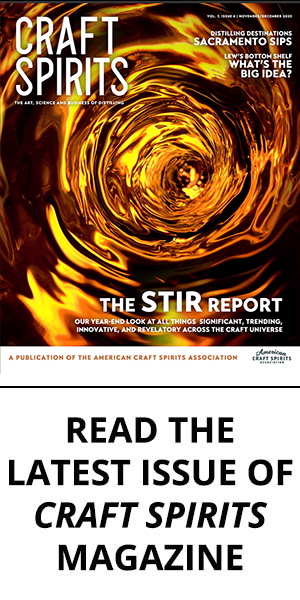In a recent letter to the Food and Drug Administration (FDA) and Department of Health and Human Services (HHS), the American Craft Spirits Association urged the federal government to cease and desist all audits of craft distillers who produced hand sanitizer solely during the early stages of the pandemic due to a nationwide shortage. According to an ACSA survey and conversations with distillers, more than a dozen distilleries across the nation have received letters from the FDA regarding formulation.
In the inquiries, the FDA is asking for records of production and distribution from distilleries, all of whom have ceased production and degregistered their hand sanitizer. The distilleries are uncertain if they face recalls or fines, some have hired legal counsel, and one told Reason Magazine that they wished they never made hand sanitizer.
“At a point in time, I was so glad of sanitizer, and right now, I wish we’d never done it,” Jesse Lupo, owner and distiller at Mossy Ledge Spirits in Etna, Maine, told Reason, while also reporting that his company took out a $45,000 loan to produce sanitizer at a very marginal profit. “I will not put myself on this same chopping block again.”
A key issue is the amount of acetaldehyde, an organic chemical compound that occurs naturally in fruit, coffee, bread and in beer, wine and spirits. The FDA’s limit on acetaldehyde in hand sanitizer is 50 parts per million (ppm). In an essay for The Washington Examiner, Aaron Bergh of Paso Robles, California-based Calwise Spirits Co., wrote that the FDA alleges that his distillery’s hand sanitizer—which it has not produced for two years—contains 160 ppm of acetaldehyde, and it was unclear when the sample was taken. “For comparison, a single glass of wine can contain 1,000 times more acetaldehyde than a dose of my hand sanitizer,” Bergh wrote. “Moreover, the Occupational Safety and Health Administration permits exposure to acetaldehyde in concentrations of 200 ppm for eight hours. Perhaps strangest of all, acetaldehyde is listed on the FDA’s “Generally Recognized As Safe” list for use in food and beverages.
Bergh also mentions that a recent industry report concluded that “hand sanitizers manufactured using ethanol with concentrations of 1,000 [ppm] exposes consumers to levels of acetaldehyde well below both common everyday natural sources, and well within acceptable occupational exposure limits.”
In its letter to the FDA and HHS, ACSA CEO Margie A.S. Lehrman noted that the distilleries who made hand sanitizer stepped up to fulfill a patriotic duty during a shortage.
“Unfortunately, those that complied with initial registration, finished producing sanitizer, sold it or disposed of inventory, and timely deregistered, are still being subjected to audits, testing and possible recalls,” wrote Lehrman. “We believe this is unreasonable and punitive to small businesses. This is especially true since the testing and notification could be up to 18 months after the samples were collected, and most of these distilleries have long since exited any connection with the sanitizer business.
“[Some] members have spent upwards of $25,000 on legal fees to protect their reputation and brand, the very small businesses who have already suffered greatly at the hands of the pandemic.”
The audits come more than a year after HHS withdrew the FDA’s surprise $14,060 fees to craft distillers who produced hand sanitizer in 2020. The withdrawal occurred on the heels of ACSA discussions with HHS leaders along with extensive outreach to congressional legislators.
Click here to read ACSA’s recent letter.
If you are a craft distiller who has been contacted recently by the FDA about hand sanitizer, please send a note to legislation@americancraftspirits.org. Your contact information will be confidential as ACSA is only trying to accurately represent the scope of the problem and its impacts to small businesses.


